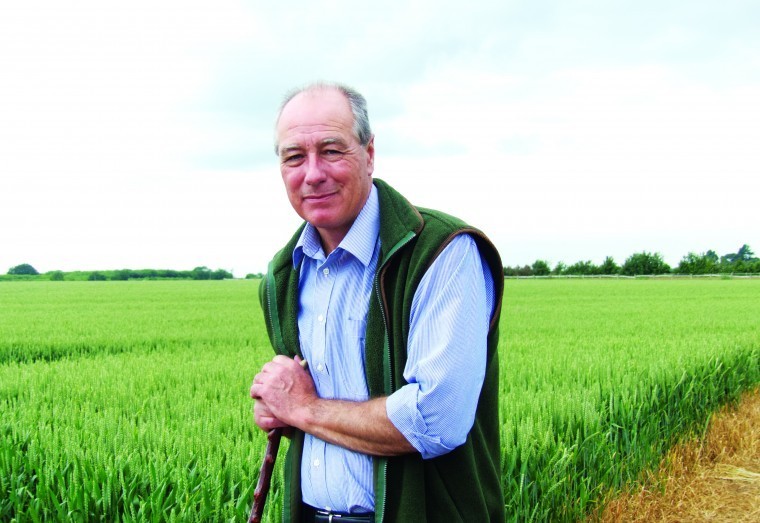It is certainly dry on the heavy clay soils for a change and that will definitely help root structure at this time of the year but may mean dryer soils earlier in the spring. Still it really is too early to get concerned and as we all know a wet February would soon right matters.
The downside to the dry fields is that night time hare coursing is rife as vehicles can be driven anywhere without fear of getting stuck even on the heavy clay fields of the Weald. There are very few arable fields in Kent without the tell tale tyre tracks running across them. It is disappointing that hares are being persecuted to this extent and no doubt when the hare population is next assessed countrywide and found to be back in decline it will be farmers and farming practices to blame rather than the real culprits. The only areas on our farms where good numbers remain is the ring fenced areas and even there occasionally gates are rammed at night to gain access.
Crop wise little of note is occurring. Kerb on oilseed rape is doing a good job on grassweeds in near ideal conditions. Pigeons are increasingly interested in eating the crops but far from starving and can be managed away at present. As mentioned last month we have tried Hatra on some wheat fields with emerged black-grass problems and we have had some effect albeit not conclusive yet. But if the residual part of the application stops any further black-grass emergence that will be tolerable.
The most noticeable thing is that with the late wheat drilling forced upon us to manage black-grass wherever we have even a small rabbit population the damage is severe. As crop growth is currently slow to non existent until spring turns up, we are going to be spending time on rabbit control as well as pigeon minding the oilseed rape crops.
As I write this article we have just had the latest prime ministerial statement on Brexit. We do now know that a bad deal is worse than no deal, although who that considers is less clear and that any deal is going to take time so transitional arrangements are desirable to avoid a cliff edge departure and change.
That is the right point to start but practically, or in the worst case scenario, we should expect World Trade Organisation (WTO) terms of trade with Europe starting in March 2019. Agriculture is a special case as we all know and may well have its own bespoke solution but I would rather take the starting point of where we are currently and where we may be in two years time.
Just considering the arable sector and looking back to 2015 we had one of the best wheat harvests for a long while, average oilseed and spring barley yields and poor pulses all undermined by very poor market prices. Most arable businesses would have failed to make a farming profit even with the basic payment scheme (BPS) subsidy.
This year we have had poorer wheat yields, terrible oilseed rape yields in Kent, average spring barley and poor pulse yields again. Clearly we have had better prices on the back of the Brexit vote and weaker currency. Depending on how much forward selling was done and with a 16% better BPS payment arable farms may have done better but not much. So currently even with the benefits of a devalued pound arable farming is not profitable without support payments and that is without the input cost increases that will flow from the lower pound.
From that starting point what does our industry want from government over the next two years? Reasonably we can ask for continued support to maintain a farming industry during spells of poor commodity prices and for some equivalence to our nearest farming competitors in Europe. We can also ask for the longest possible period of transition to whatever the new model farming circumstances are going to be.
Clearly we will have new circumstances and my particular concern is that we look very carefully at any measures we ask for that could undermine our future competitiveness. The siren call of new environmental schemes will be raised by non governmental organisations and farmers. But in WTO terms they can only be on an income foregone basis and I cannot see that being much use to productive farming. Certainly some high value environmental areas will need bespoke schemes to keep farmers on the land, assuming that management of that land is desirable. But that can only be in specified areas.
Practically, removal of all unnecessary regulation will help but on that note Theresa May confirmed that all European Union regulation would be transposed into our own laws with a gradual review and removal or replacement. This country rarely repeals laws and that normally only happens when they are replaced with something more onerous. But it is an area we should certainly focus on and be clear on what we regard as eroding our competitiveness and needs removing from an early stage.
We can ask for consideration in any trade deal with Europe and with other countries. But we can all see the imperative for new trade deals and government will be keen to promote services and car manufacturers. To counteract that lobbying of MPs will be vital and it is true that the current government represents most of the rural constituencies in England. But given a choice of making a success of Brexit with new trade deals or ensuring a future for agriculture who in farming would have confidence in the outcome. I am generally an optimist – well I have been a farmer for my whole life! But I struggle to see much that encourages me to be optimistic about the future of farming at the moment.




